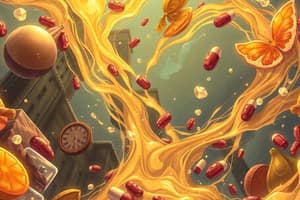Podcast
Questions and Answers
What is the primary purpose of having a control group in an experiment?
What is the primary purpose of having a control group in an experiment?
- To reduce the overall time of the experiment
- To increase the number of participants
- To provide a similar treatment
- To isolate the effects of the treatment (correct)
The placebo control group receives a treatment that contains actual caffeine.
The placebo control group receives a treatment that contains actual caffeine.
False (B)
How much did the treatment group’s average stress level increase after the study?
How much did the treatment group’s average stress level increase after the study?
20%
Participants in the treatment group are given __________.
Participants in the treatment group are given __________.
Match the following groups with their descriptions:
Match the following groups with their descriptions:
What increase in average stress level did the control group experience?
What increase in average stress level did the control group experience?
The placebo effect occurs when participants experience changes due to belief rather than actual treatment.
The placebo effect occurs when participants experience changes due to belief rather than actual treatment.
What is the expected effect of caffeine on stress for participants in the treatment group?
What is the expected effect of caffeine on stress for participants in the treatment group?
What is the independent variable in the research measuring the relationship between caffeine and stress?
What is the independent variable in the research measuring the relationship between caffeine and stress?
The null hypothesis states that there will be a difference in the level of stress reported by participants who receive varying doses of caffeine.
The null hypothesis states that there will be a difference in the level of stress reported by participants who receive varying doses of caffeine.
What is meant by operationalising a variable?
What is meant by operationalising a variable?
In this research, stress can be measured by scores on a __________ that asks participants to rate their stress.
In this research, stress can be measured by scores on a __________ that asks participants to rate their stress.
Which of the following is considered an extraneous variable in the research?
Which of the following is considered an extraneous variable in the research?
Match the following terms with their definitions:
Match the following terms with their definitions:
The operationalisation of caffeine in the study involved using 5 cups of coffee to achieve a total of 250mg of caffeine.
The operationalisation of caffeine in the study involved using 5 cups of coffee to achieve a total of 250mg of caffeine.
Name one confounding variable that can affect the dependent variable in this study.
Name one confounding variable that can affect the dependent variable in this study.
What is the dependent variable (DV) in an experiment?
What is the dependent variable (DV) in an experiment?
Confounding variables can be controlled in an experiment.
Confounding variables can be controlled in an experiment.
Name one advantage of using the experimental research tool.
Name one advantage of using the experimental research tool.
The researcher manipulates the __________ variable to observe its effect on the dependent variable.
The researcher manipulates the __________ variable to observe its effect on the dependent variable.
Match the type of variable with its description.
Match the type of variable with its description.
Which of the following is NOT a characteristic of the experimental research method?
Which of the following is NOT a characteristic of the experimental research method?
Evaluation apprehension occurs when participants are unaware they are part of an experiment.
Evaluation apprehension occurs when participants are unaware they are part of an experiment.
List one disadvantage of the experimental research method.
List one disadvantage of the experimental research method.
What is the percentage by which caffeine is concluded to increase stress levels after deductions are made?
What is the percentage by which caffeine is concluded to increase stress levels after deductions are made?
A double-blind procedure allows only the experimenter to remain unaware of group assignments.
A double-blind procedure allows only the experimenter to remain unaware of group assignments.
What must a researcher manipulate to conduct a true experiment?
What must a researcher manipulate to conduct a true experiment?
If one or more criteria for a true experiment are not met, it will automatically be a _______.
If one or more criteria for a true experiment are not met, it will automatically be a _______.
What is one disadvantage of true experiments?
What is one disadvantage of true experiments?
Quasi experiments can manipulate independent variables effectively.
Quasi experiments can manipulate independent variables effectively.
What is evaluation apprehension?
What is evaluation apprehension?
What is a disadvantage of quasi-experiments?
What is a disadvantage of quasi-experiments?
Laboratory experiments have high ecological validity.
Laboratory experiments have high ecological validity.
What is one advantage of laboratory experiments?
What is one advantage of laboratory experiments?
A common example of a demand characteristic is the __________ effect.
A common example of a demand characteristic is the __________ effect.
Match the type of experiment to its characteristic:
Match the type of experiment to its characteristic:
What is a primary limitation of field experiments?
What is a primary limitation of field experiments?
Quasi-experiments allow random assignment of participants to groups.
Quasi-experiments allow random assignment of participants to groups.
Name one reason why laboratory experiments are easy to replicate.
Name one reason why laboratory experiments are easy to replicate.
What is one significant disadvantage of field experiments?
What is one significant disadvantage of field experiments?
Field experiments have less ecological validity compared to lab experiments.
Field experiments have less ecological validity compared to lab experiments.
What is a natural experiment?
What is a natural experiment?
In a natural experiment, the independent variable is the change in the situation __________ the event.
In a natural experiment, the independent variable is the change in the situation __________ the event.
Which of the following is a key advantage of natural experiments?
Which of the following is a key advantage of natural experiments?
Extraneous variables are more easily controlled in field experiments than in lab experiments.
Extraneous variables are more easily controlled in field experiments than in lab experiments.
What term describes a researcher’s prediction about the relationship between independent and dependent variables?
What term describes a researcher’s prediction about the relationship between independent and dependent variables?
Flashcards
Hypothesis
Hypothesis
The proposed relationship between variables in a study.
Null Hypothesis
Null Hypothesis
The opposite of the hypothesis; states there's no relationship between variables.
Independent Variable (IV)
Independent Variable (IV)
The variable that the researcher manipulates or changes.
Dependent Variable (DV)
Dependent Variable (DV)
Signup and view all the flashcards
Operationalisation of Variables
Operationalisation of Variables
Signup and view all the flashcards
Extraneous Variables
Extraneous Variables
Signup and view all the flashcards
Confounding Variables
Confounding Variables
Signup and view all the flashcards
Confounding Variables
Confounding Variables
Signup and view all the flashcards
Advantages of Experimental Research
Advantages of Experimental Research
Signup and view all the flashcards
Disadvantages of Experimental Research
Disadvantages of Experimental Research
Signup and view all the flashcards
How to Conduct an Accurate Experiment
How to Conduct an Accurate Experiment
Signup and view all the flashcards
Treatment group
Treatment group
Signup and view all the flashcards
Control group
Control group
Signup and view all the flashcards
Placebo control group
Placebo control group
Signup and view all the flashcards
Placebo effect
Placebo effect
Signup and view all the flashcards
Random assignment
Random assignment
Signup and view all the flashcards
Keeping variables constant
Keeping variables constant
Signup and view all the flashcards
True effect
True effect
Signup and view all the flashcards
Single-blind Procedure
Single-blind Procedure
Signup and view all the flashcards
Double-blind Procedure
Double-blind Procedure
Signup and view all the flashcards
True Experiment
True Experiment
Signup and view all the flashcards
Quasi-Experiment
Quasi-Experiment
Signup and view all the flashcards
Independent Variable
Independent Variable
Signup and view all the flashcards
Dependent Variable
Dependent Variable
Signup and view all the flashcards
Example of Quasi-Experiment
Example of Quasi-Experiment
Signup and view all the flashcards
Laboratory Experiment
Laboratory Experiment
Signup and view all the flashcards
Example of a Lab Experiment
Example of a Lab Experiment
Signup and view all the flashcards
Field Experiment
Field Experiment
Signup and view all the flashcards
Natural Experiment
Natural Experiment
Signup and view all the flashcards
Hawthorne Effect
Hawthorne Effect
Signup and view all the flashcards
Demand Characteristics
Demand Characteristics
Signup and view all the flashcards
Ecological validity
Ecological validity
Signup and view all the flashcards
Lab experiment
Lab experiment
Signup and view all the flashcards
Replicability
Replicability
Signup and view all the flashcards
Study Notes
Variables in Experiments
- Variable: Any object, quality, or event that changes. Examples include noise and performance.
- Independent Variable (IV): The variable the experimenter manipulates to see its effect on another variable.
- Dependent Variable (DV): The variable measured in an experiment. It's typically influenced by the IV.
- Extraneous Variables: Factors that might affect the DV, other than the IV, Researchers need to try to control these. Examples include time of day, mood, hunger, amount of sleep, previous experience.
- Confounding Variables: Extraneous variables that researchers cannot control that interfere with the experiment and influence the results.
Advantages and Disadvantages of Experiments
-
Advantages:
- Ideal for quantitative studies where variables are manipulated.
- Can confirm or reject a hypothesis.
- Establishes relationships between variables.
- Easier to assess validity and reliability than qualitative methods.
- Numerical data is easy to analyze.
- Offers high objectivity.
-
Disadvantages:
- Evaluation apprehension if participants know they are being tested.
- Need many participants.
- Not all topics are suitable for experiments.
- Individuality is not considered the same each time the experiment is run.
Conducting Accurate Experiments
- Procedure:
- Manipulate the independent variable (IV).
- Measure the dependent variable (DV).
- Minimize the effects of extraneous variables.
- Draw conclusions about the relationship and confirm/reject the hypothesis.
Example of Experiment: Caffeine and Stress
- Title: Measuring the relationship between caffeine and stress.
- Hypothesis: Participants with a high dose of caffeine will show increased stress levels.
- Null Hypothesis: No difference in stress levels between participants with different caffeine doses.
- Independent Variable: Amount of caffeine.
- Dependent Variable: Participants' stress levels.
- Operationalization: Stress needs a clear definition (e.g., scores on a questionnaire or blood pressure). Caffeine dosage must be precise (e.g., 250mg of caffeine in 5 cups).
Possible Extraneous Variables
- Caffeine intake before the experiment.
- Participants' expectations/experiences.
- Feelings of stress from experimental situation itself.
- Timing of the experiment.
- Mood of the participants.
Placebo Control Group
- Participants getting a placebo (fake) treatment.
- Used to isolate the true effects of the IV (caffeine).
- Helps ensure that stress changes relate to caffeine rather than expectations alone.
Single-Blind and Double-Blind Procedures
- Single-blind: Participants unaware of group assignments.
- Double-blind: Neither participants nor researchers know assignments to minimize researcher bias.
True vs. Quasi Experiments
- True Experiments:
- Random assignment to groups.
- Manipulation of the independent variable (IV).
- Control over variables (most accurate).
- Quasi Experiments:
- No random assignment to groups.
- Natural or pre-existing IVs (e.g., gender, age).
Types of Experiments
- Lab Experiments: Take place in controlled environments, maximizing control over variables.
- Field Experiments: Conducted in natural settings, allowing for high ecological validity, but harder to control extraneous variables.
- Natural Experiments: Researchers study naturally occurring events and their effects on a dependent variable (DV).
Demand Characteristics
- Participant expectations of the experiment influence their behavior.
- Participants may try to please the researcher (screw-you effect).
Hawthorne Effect
- Participants work harder or perform better when being observed.
- Can influence results in studies.
Studying That Suits You
Use AI to generate personalized quizzes and flashcards to suit your learning preferences.
Related Documents
Description
Test your knowledge on the effects of caffeine on stress levels through this quiz, which covers key concepts such as control groups, independent variables, and the placebo effect. Explore the dynamics of experimental design and learn how varying doses of caffeine influence stress in participants.




